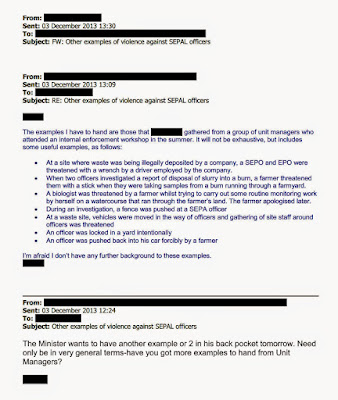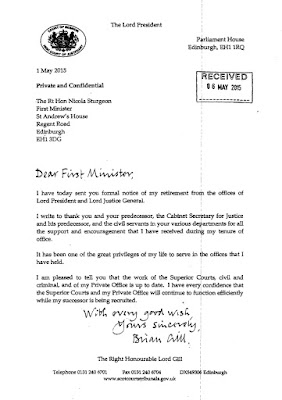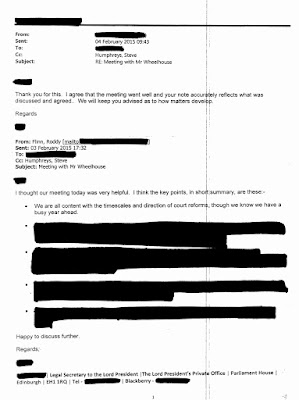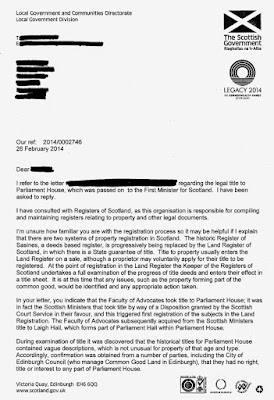First Minister recommended judge role for lawyer - who found her guilty of misconduct. AN INVESTIGATION has established Scotland’s First Minister – Nicola Sturgeon – was found to have committed THREE counts of professional misconduct by a solicitor she later recommended for the position of a Sheriff within Scotland’s powerful judiciary - currently led by Lord President - Lord Carloway.
The findings of professional misconduct by Sheriff Pasportnikov against the First Minister - were the result of a complaint lodged by a client to the law firm where Nicola Sturgeon worked at the time – Bell & Craig solicitors.
The complaint against Nicola Sturgeon involved the currently serving First Minister’s failure to provide adequate legal services to a victim of domestic violence.
And, the issues in relation to Ms Sturgeon’s failure to provide adequate legal services only came to light after Ms Sturgeon suddenly left the law firm = and the client was forced to go to another solicitor – who it was reported - discovered legal aid forms had not been sent to the Scottish Legal Aid Board – despite assurances the legal aid application had been submitted.
In response to the complaint – the Law Society of Scotland appointed a case manager – a solicitor, and now Sheriff - Olga Pasportnikov - to investigate.
In a five-page report, dated Dec 1998, Olga Pasportnikov said: “The complaint in this case has been identified as professional misconduct by breach of code of conduct and conduct unbecoming a solicitor.”
Pasportnikov identified three counts ‘of professional misconduct by breach of code of conduct and conduct unbecoming a solicitor’.
They were: failing to raise interdict, misleading client about legal aid application & failing to properly consider her financial circumstances
Among ‘circumstances which have been ascertained during the course of the enquiry’ were the legal aid form had been completed and signed by the client and the client’s employers but not sent.
Despite the findings of Sheriff Pasportnikov, and her identification of multiple serious issues where she concluded Ms Sturgeon’s failure to provide competent legal services qualified as professional misconduct - the Law Society of Scotland concluded there should be no further action and Nicola Sturgeon left the legal profession.
It is important to note - the Law Society of Scotland cleared Nicola Sturgeon even after their case manager Ms Pasportnikov identified various breaches of professional misconduct by Nicola Sturgeon – and that Ms Sturgeon – who then 'stood down’ from the legal profession – to contest a seat for the Scottish National Party – then entered politics without an on the record finding of professional misconduct by the Law Society of Scotland.
Records show from announcements in the legal profession’s press, and Scottish Government news postings - Announced on 31 July 2015 - Olga Pasportnikov was appointed by the Queen following a report to the First Minister Nicola Sturgeon - by the Judicial Appointments Board for Scotland.
Ms Pasportnikov, a University of Dundee graduate, was admitted as a solicitor in 1991. She worked mainly in private practice before joining the Law Society of Scotland in 1998. She has been with the Crown Office & Procurator Fiscal Service since 2003, and is also current convener of the Fife Young Carers Management Committee.
The First Minister has statutory responsibility for making recommendations to Her Majesty the Queen and is required by statute to consult the Lord President of the Court of Session before making her recommendation.
The Judicial Appointments Board for Scotland is an ‘independent’ advisory public body with the role of recommending individuals for appointment to judicial offices within the Board’s remit including judge of the Court of Session, chair of the Scottish Land Court, sheriff principal, sheriff, and summary sheriff.
It has since come to light this story was filed with a Scottish newspaper for publication in June 2018 – after several other newspapers refused to publish the story.
According to now deleted tweets from a former journalist which have now been widely published online – a story on the complaint regarding Nicola Sturgeon’s failure to provide adequate legal services to a victim of domestic violence, and the identification of several counts of professional misconduct against Ms Sturgeon by currently serving Sheriff Olga Pasportnikov - had support from one editor to be published – until a ‘Political editor’ at the same newspaper voted the story down.
The deleted tweet goes on to allege that some weeks later, the same newspaper which did not publish the story on Nicola Sturgeon - was leaked details of the harassment complaints against Alex Salmond and the investigation by Police Scotland - which subsequently led to Mr Salmond being charged with 14 offences, including two counts of attempted rape, nine of sexual assault, two of indecent assault, and one of breach of the peace.
Mr Salmond appeared in court on 21 November 2019 and entered a plea of "not guilty".
At the subsequent trial, Mr Salmond was cleared by a jury trial - heard by Scotland's Lord Justice Clerk - Lady Dorrian.
The information came to light after Justice Committee Convener Adam Tomkins (Scottish Conservative) & former Scottish Government Legal Affairs Minister Annabelle Ewing (Scottish National Party) made a motivated and concerted effort to close down the same Judicial Interests Register petition which Nicola Sturgeon has opposed and sought to close - throughout her term as First Minister.
The Justice Committee hearing of 2 March 2021 can be viewed here: Register of Judges Interests Petition PE 1458 Scottish Parliament Justice Committee 2 March 2021
This is the same Judicial Interests Register petition the First Minister has tried to undermine and block since Ms Sturgeon became First Minister.
If a Register of Judges’ Interests did become a requirement – Sheriff Pasportnikov who found Nicola Sturgeon guilty of professional misconduct may be forced to list that fact and other details of her service to the Law Society of Scotland.
On Wednesday 3 March 2021 - the Judicial Office for Scotland were asked the following questions:
A currently serving Sheriff - Olga Pasportnikov - conducted an investigation of complaints lodged about Scotland's current First Minister Nicola Sturgeon while she was a solicitor at a law firm identified as Bell & Craig
Ms Pasportnikov was, as the Judicial Office will be aware - a case manager for the Law Society of Scotland from September 1998 to March 2003
In a five-page report released in December 1998, Olga Pasportnikov said: "The complaint in this case has been identified as professional misconduct by breach of code of conduct and conduct unbecoming a solicitor."
Olga Pasportnikov found Ms Sturgeon guilty of 3 identifyable counts of professional misconduct:
They were: failing to raise interdict as instructed, misleading client about legal aid application, failing to properly consider the client's financial circumstances
Events then saw the Law Society clear Ms Sturgeon, who quickly left the legal profession.
Noting Ms Pasportnikov currently declares her time at the Law Society of Scotland on her Linkedin page as a "case manager" - along with other career attributes including a term at the Crown Office as a Procurator Fiscal Depute, and her current role as a serving Sheriff
- does Sheriff Pasportnikov have any comment onthe following questions:
why she does not list her role of investigating complaints against solicitors?
why she found Ms Sturgeon guilty of 3 identifyable issues of professional misconduct?
why no regulatory punishment took place upon Sheriff Pasportnikov's findings?
Does the Judicial Office have any comment on the above events and any comment on the impact of a currently serving Sheriff with a long history as a solicitor, prosecutor and now a judge - having found Scotland's current First Minister Nicola Sturgeon guilty of three counts of professional misconduct to which no sanction was ever applied by legal regulators and never declared in any register of interests?
On Friday 5 March 2021 - the Judicial Office for Scotland (JOFS) issued a statement to the media.
The Judicial Office claimed Sheriff Pasportnikov had forgotten she had investigated a complaint case involving the current First Minister Nicola Sturgeon,
A spokesperson for the Judicial Office said:
“The Sheriff was one of a number of case managers working on the Law Society for Scotland’s Client Relations Team from 1998 – 2003. Her role was limited to that of gathering and categorising information as a first step in a much longer process. She did not produce any reports or make any findings. Covering a volume of work, she would not remember specific names in routine cases, including where a solicitor was cleared entirely.”
“In Scotland, sheriffs are appointed by Her Majesty on the recommendation of the First Minister, who makes their recommendation on the basis of a report by the Judicial Appointments Board for Scotland (JABS). The First Minister has statutory responsibility for making recommendations to Her Majesty and is required by statute to consult the Lord President of the Court of Session before making their recommendation.”
“JABS is an independent advisory public body with the role of recommending individuals for appointment to judicial offices within the Board’s remit including judge of the Court of Session, chair of the Scottish Land Court, sheriff principal, sheriff, and summary sheriff.”
A response to the Judicial Office statement was submitted - querying the JOFS claim, and confirming - that material now in the public domain - does confirm Sheriff Pasportnikov did in-fact – investigatge a complaint against Nicola Sturgeon and that Sheriff Pasportnikov identified several breaches of professional misconduct by Ms Sturgeon.
No reply to the additional query has been received, nor has the Judicial Office disputed the terms of questions & information supplied to JOFS staff.
It would be difficult to believe a case relevant to the current First Minister was forgotten about by the investigating reporter - Sheriff Pasportnikov - as there is obviously only one Nicola Sturgeon in Scotland - the current First Minister.
Earlier today, a legal expert assessed the material now in the public domain and deleted tweets from a former journalist which names a Scottish newspaper and a ‘spiked’ story on Ms Sturgeon.
The legal expert said he hoped the Committee on the Scottish Government Handling of Harassment Complaints would now scrutinise the information available and ask further questions of the First Minister.
He said: “In view of suggestions on social media platforms - a former journalist held this information for a number of years, and approached several newspapers seemingly without success - people may reasonably expect questions to be asked of why this story has not come to light until now and the method of travel to the media.”
He added: “Was there motive in withholding this story involving Scotland’s First Minister, either by a newspaper, a political party or a journalist? I am curious to find out. However, I am also curious as to why no one with the information offered the material in evidence to the long running Scottish Parliament investigation of issues involving Alex Salmond.”
“Given the First Minister responded to questions on what appear to be references to the investigation of Ms Sturgeon and a newspaper deal - MSPs should ask rigorous questions of anyone involved in this matter given the situation we face where information now exists alleging the Sheriff complaint probe of Scotland’s First Minister was allegedly swapped for a story on harassment complaints and a Police investigation of Alex Salmond in the summer of 2018”
In discussions late this afternoon – others have come forward to confirm they were aware of this story for some time, but were unable to obtain any answers from Ms Sturgeon on these events.
JUDICIAL INTERESTS REGISTER - would have required declaration of Sheriff’s role in FM Complaint:
It has been previously reported Nicola Sturgeon personally intervened to block the Judicial Register petition - during a long running investigation by the Scottish Parliament’s Public Petitions Committee
The surprise intervention by the First Minister in the bid to bring transparency to Scotland’s secretive judges came to light after a failed attempt by her then Legal Affairs Minister – Paul Wheelhouse – to overturn the petition with claims that ‘gangsters’ could misuse information in a judges register.
In the letter – dated 30 March 2015 - Nicola Sturgeon also revealed Legal Affairs Minister Paul Wheelhouse had a secret meeting in February 2015 with Lord Gill to discuss the petition and the Judiciary & Scottish Government’s concerted opposition to creating the Judicial Register.
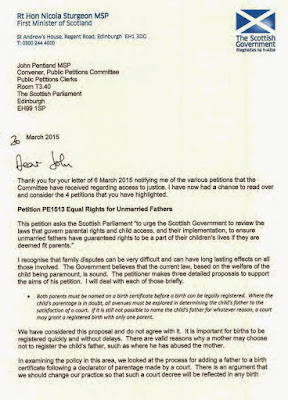 Writing in the letter to John Pentland MSP, Convener of the Public Petitions Committee, the First Minister said: “This petition calls on the Scottish Government to create a Register of Interests for the Judiciary. The Scottish Government considers that such a register of judicial interests is not necessary and that the existing safeguards - the Judicial Oath, the Statement of Principles of Judicial Ethics and the system for complaints against the judiciary - are sufficient. These safeguards, together with the register of judicial recusals, are sufficient to protect individuals from judicial bias.”
Writing in the letter to John Pentland MSP, Convener of the Public Petitions Committee, the First Minister said: “This petition calls on the Scottish Government to create a Register of Interests for the Judiciary. The Scottish Government considers that such a register of judicial interests is not necessary and that the existing safeguards - the Judicial Oath, the Statement of Principles of Judicial Ethics and the system for complaints against the judiciary - are sufficient. These safeguards, together with the register of judicial recusals, are sufficient to protect individuals from judicial bias.”
Further to the evidence that the Minister for Community Safety and Legal Affairs, Mr Wheelhouse, gave to the Committee on 9 December 2014, he discussed this petition when he met the Lord President in February. The Minister acknowledged the Lord President's concerns about the introduction of a register of judicial interests. The breadth of such a register would make it virtually unworkable. It would need to cover not only financial interests, but also memberships of groups and associations and familial and social relationships. Even so, such a register might not capture relevant issues that could arise.”
“The position of the judiciary is different from that of MSPs and others who hold public office. The judiciary cannot publicly defend themselves. The Lord President has cautioned that such a register could also have unintended consequences. Consideration requires to be given to judges' privacy and freedom from harassment by aggressive media or hostile individuals, including dissatisfied litigants. In addition, there is currently no evidence that judges who should have recused themselves from cases have not done so.”
The Sunday Herald newspaper reported on First Minister Nicola Sturgeon’s intervention on behalf of the judiciary and her opposition to the judicial transparency proposal:
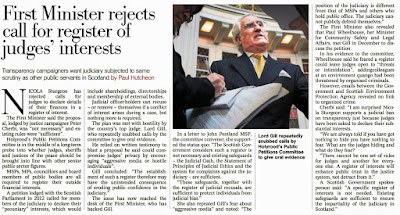 First Minister rejects call for register of judges' interests
First Minister rejects call for register of judges' interests
Paul Hutcheon Investigations Editor Sunday 10 May 2015
NICOLA Sturgeon has rejected calls for judges to declare details of their finances in a register of interest. The First Minister said the proposal, lodged by justice campaigner Peter Cherbi, was "not necessary" and claimed existing rules were "sufficient".
Holyrood's Public Petitions Committee is in the middle of a long-term probe into whether judges, sheriffs and justices of the peace should be brought into line with other senior public sector figures.
MSPs, MPs, councillors and board members of public bodies are all required to register their outside financial interests.
A petition lodged with the Scottish Parliament in 2012 called for members of the judiciary to declare their "pecuniary" interests, which would include shareholdings, directorships and membership of external bodies.
Judicial officer holders can recuse - or remove - themselves if a conflict of interest arises during a case, but nothing more is required.
The plan was met with hostility by the country's top judge, Lord Gill, who repeatedly snubbed calls by the committee to give oral evidence. He relied on written testimony to blast a proposal he said could compromise judges' privacy by encouraging "aggressive media or hostile individuals".
Lord Gill concluded: "The establishment of such a register therefore may have the unintended consequence of eroding public confidence in the judiciary."
The issue has now reached the desk of the First Minister, who has backed Lord Gill.
In a letter to John Pentland MSP, the Committee convener, she supported the status quo: "The Scottish Government considers that such a register of judicial interests is not necessary and that the existing safeguards - the Judicial Oath, the Statement of Principles of Judicial Ethics and the system for complaints against the judiciary - are sufficient.
"These safeguards, together with the register of judicial recusals, are sufficient to protect individuals from judicial bias."
She also repeated Lord Gill's fear about "aggressive media" and noted: "The position of the judiciary is different from that of MSPs and others who hold public office. The judiciary cannot publicly defend themselves."
The First Minister also revealed that Paul Wheelhouse, her Minister for Community Safety and Legal Affairs, met Lord Gill in December to discuss the petition.
In his evidence to the Committee, Wheelhouse said he feared a register could leave judges open to "threats or intimidation", adding that colleagues at an environment quango had already been threatened by organised criminals. However, emails between the Government and Scottish Environment Protection Agency revealed no link to organised crime.
Cherbi said: "I am surprised Nicola Sturgeon supports a judicial ban on transparency just because judges have been asked to declare their substantial interests. "We are always told if you have got nothing to hide you have nothing to fear. What are the judges hiding and what do they fear? "There cannot be one set of rules for judges and another for everyone else. A register of interests will enhance public trust in the justice system, not detract from it."
A Scottish Government spokesperson said: "The Scottish Government considers that a specific register of interests is not needed. Existing safeguards, including the Judicial Oath, the Statement of Principles of Judicial Interests and the system of complaints against the judiciary, are sufficient to ensure the impartiality of the judiciary in Scotland."
Previous articles on the lack of transparency within Scotland’s judiciary, investigations by Diary of Injustice including reports from the media, and video footage of debates at the Scottish Parliament’s Public Petitions Committee can be found here : A Register of Interests for Scotland's Judiciary

